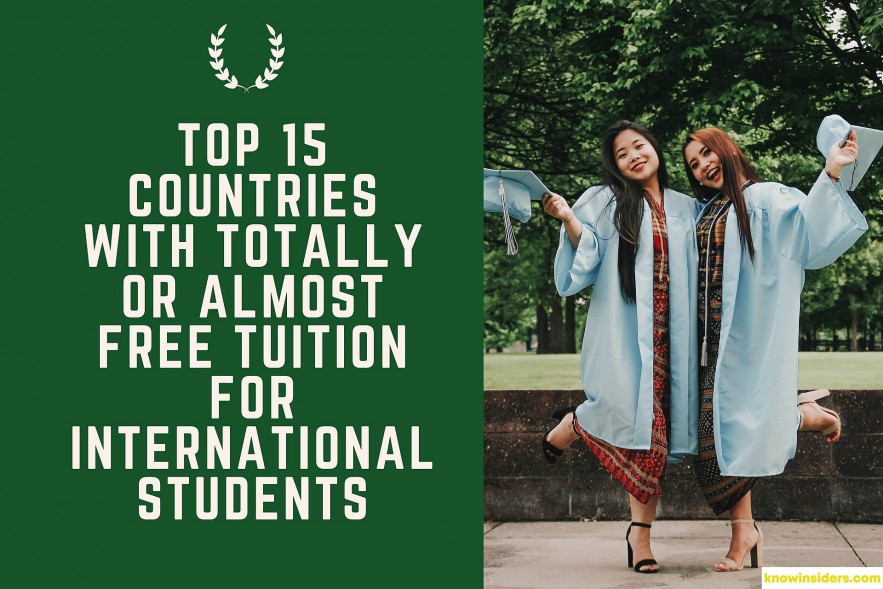Top 15 Countries With The Free Tuition for International Students
 |
| Top 15 Countries With Totally or Almost Free Tuition for International Students. Photo: KnowInsiders.com |
| Contents |
Tuition is one of many factors that determines how inclusive education is. In addition to the cost of housing and food, international students—particularly those without scholarships—find it extremely difficult to balance their tuition.
To help you study without having to worry about financial burden, we have put together a list of the top 15 countries offering free tuition for international students. The majority of the nations on the list are in Europe, which is not surprising.
Top 15 Countries With Totally or Almost Free Tuition for International Students
1. Germany
Free for who: Everyone (except for universities in the state of Baden-Württemberg)
Germany is one of the most popular destinations for international students to study in Europe. Not only is Germany famous for an education with advanced training quality and for owning many QS-ranked universities, Germany is also chosen by international students for its quality training programs taught in English at both bachelor's and master's/doctoral levels completely free of charge at public universities.
 |
| Photo Alpadia |
Unless you are enrolled in a master's program that differs from bachelor's level majors, there is no tuition for bachelor's and master's degree programs in Germany for students, including foreign students from any country. The universities in the state of Baden-Württemberg are one noteworthy exception. For non-EU resident students enrolled in Bachelor, Master, College, and state examination degree programs, the state of Baden-Württemberg currently charges a tuition fee of 1,500 EUR per semester. However, most Master's programs in Germany charge tuition, albeit not as much as in other nations, in contrast to Undergraduate programs.
All German universities offer PhD programs with full tuition waivers for a minimum of six semesters. It's also crucial to remember that, depending on the level you choose to enroll in, you might have to pay an administration fee (between 100 and 350 EUR/term), which consists of the registration fee and the student services management fee.
Furthermore, you might still be required to pay course tuition in Bremen, Lower Saxony, Saarland, Saxony, Saxony-Anhalt, or Thuringia if you are not able to finish your study program on time.
2. Sweden
 |
| Photo hotcourses |
Free for who: EU, EEA and Switzerland
Tuition for PhD programs in Sweden is entirely waived for international students from any nation.
If you want to pursue a bachelor's or master's degree program as a student from a non-EU or EEA nation, you will need to pay tuition fees that range from 7,500 to 25,000 EUR per year, or up to 31,000 EUR per year for some programs.
The Visby scholarship program, which is available to students enrolled in courses on sustainability, innovation, or community responsibility, or merit-based scholarships provided by colleges, private foundations, and organizations are just a few examples of the incredibly varied array of scholarship opportunities available in Sweden.
READ MORE: Is It True Or Myth That Higher Education Is Important In The 21st Century?
3. Finland
Free for who: EU, EEA and Switzerland
Finland has two categories for universities: regular universities and universities of applied sciences.
For individuals who are already proficient in Finnish or Swedish, there's good news: courses offered in these two languages are still free for foreign students from any nation. It is common for PhD candidates in Finland to be granted full tuition reimbursement. You will still be required to pay the course tuition if you are an international student from outside the European Union and would like to enroll in English-taught courses.
The average annual tuition at a public university in Finland is between 6,000 and 18,000 euros; the University of Helsinki charges the highest tuition, between 13,000 and 18,000 euros.
Finland's universities offer attractive scholarships to foreign students in exchange. Every university will have its own scholarship programs, which are assessed according to students' aptitude and academic performance. The school may get in touch with you to go over the specifics of the scholarship they plan to offer you if you meet the requirements.
4. Norway
 |
| Photo vneconomy |
Free for who: Everyone (EU, EEA and the rest of the world)
Norway is one of the few nations in Europe, along with Finland and Germany, that offers full tuition waivers to international students. Norwegian colleges and universities are instructed not to collect tuition fees from both domestic and foreign students, according to Studyinnorway.no. This holds true for all academic levels, including PhD, master's, undergraduate, and research programs.
In Norway's public universities, studying abroad only requires a fee of roughly 30 to 60 EUR per term to cover student union dues, which also cover the cost of health and counseling services, as well as costs associated with extracurricular activities like sports and cultural events.
Tuition at private universities in Norway, which ranges from 7,000 to 19,000 EUR/five, is thought to be less expensive for both domestic and foreign students than in other nations in the area. Remember that the majority of the programs are instructed in Norwegian. A greater selection of English study programs will be available to you at the master's degree and above. In addition, your monthly living expenses in Norway will require an average of 1,200 EUR.
Depending on where you live and how you live every day, the cost of living in Norway can range from 700 to 900 EUR per month for food, housing, transportation, and other expenses. Living expenses are covered by some scholarships offered by Norwegian universities.
5. Switzerland
For those pursuing a bachelor's or master's degree who are not citizens of the EU, EEA, Switzerland, or a Nordic nation, application and tuition fees are required. Nonetheless, a large number of universities as well as the Swedish Institute provide full and partial scholarships to international students in the form of tuition waivers.
In Sweden, universities or outside funding agencies typically offer paid PhD positions. This implies that you will receive a monthly salary and not be required to pay any fees if you are hired as a PhD candidate.
The government of Switzerland provides substantial funding to public universities. Because of this, tuition is less expensive here than it would be at a US or UK university. There is no tuition for foreign students who travel to Switzerland as part of an exchange program.
| Average tuition fees at Swiss public universities: • Bachelor's and Master's programmes: 400 – 3,700 EUR/year • PhD degrees: 100 – 900 EUR/year • Swiss Private universities usually have higher tuition fees that can reach 43,000 EUR per year. Some universities offer a discount if students pay the full amount when they begin the study programme. For some degrees, tuition is calculated based on the total number of courses or credits. |
| These are some of the most affordable higher education institutions in Switzerland: • University of Geneva – average tuition fees: 900 EUR/year • University of Bern – average tuition fees: 1,700 EUR/year • University of Applied Sciences and Arts Northwestern Switzerland FHNW – average tuition fees: 1,260 EUR/year • University of Lausanne – average tuition fees: 1,040 EUR/year |
6. Austria
If you're still concerned about money issues when studying in Europe, you might want to think about Austria, a welcoming nation that attracts many international students.
Non-EU students pay relatively low tuition fees, averaging about 726.72 EUR per semester, plus 20.20 EUR per semester for student accident insurance premiums and the "ÖH-Beitrag" student union membership fee. Additionally, it is the reason Austria has drawn foreign students in recent years. It's also vital to keep in mind that tuition at private universities is frequently higher than at public universities, ranging from 3,000 to 23,000 euros annually, or even more for certain programs.
The cost of living for international students studying in Austria varies depending on where they live and study. For instance, you should budget 800-1,300 EUR per month for living expenses in Vienna and Salzburg. The cost of living in other cities, such as Graz and Linz, can vary from 800 to 1,000 EUR per month.
7. Spain
 |
| Photo hotcourses |
Spain has a long history of being a well-liked travel destination for both tourists and international students because of its mild climate, relatively cheap cost of living, and intriguing culture. Specifically, when compared to public universities in other European countries, the tuition fees at public universities in Spain are thought to be relatively inexpensive.
The majority of public universities in Spain charge between 750 and 2,500 EUR in tuition per year for both bachelor's and master's degrees. With the exception of programs offered by business schools, where tuition may reach 30,000 EUR annually, each private university's tuition is set by itself and typically does not exceed 20,000 EUR annually. Specifically, at the graduate level, tuition is assessed on a credit basis and may be greater.
You should budget at least 50 EUR per month for Spanish classes and the use of study materials.
8. Denmark
 |
| Photo vneconomy |
Free for who: EU, EEA and Switzerland
Citizens of EU/EEA nations are entitled to free higher education in Denmark. Swiss students are also entitled to free education.
Students with a permanent residency permit or those taking part in an exchange program are also eligible for free education. Denmark appears on the list of nations offering the best free education to international students as a result.
9. France
Typical tuition fees: €243 per year
Admin fees: None
Terms: The French government has set a cap on annual tuition fees for public universities in France, which makes them among the most affordable in Europe at €243. Only citizens of the EU and EEA are eligible for these minimal fees. Non-EU/EEA citizens must pay €3,770 annually.
Maybe Germany is better known for affordable education than France is. However, regardless of their nationality, international students may be shocked to hear that they can also study abroad in France for free, or at a very low cost.
Technically speaking, French public universities do not charge tuition. It costs 180€ ($250) a year in Germany to cover travel expenses.
With more specialized programs like engineering and medicine, the amount might be higher, but not significantly. Likewise in France. Most of the free study abroad programs in France are taught in the student's mother tongue. Nonetheless, an increasing number of courses—particularly in undergraduate education—are offered in English. As an alternative, if you want to hone your French before attending university, you can sign up for a preparatory school. However, this course is not free. Even though studying abroad in France is possible for free, living expenses here are fairly high, particularly in Paris. The estimated annual cost of living is 9600€ ($10.430).
10. Czech Republic
 |
| Photo vneconomy |
Free for who: Everyone (if you study in Czech!)
Admin fees: You may be charge tuition fees if you take longer than expected to complete your degree.
Terms: If you fancy learning Czech, you could take advantage of the Czech Republic’s generous approach to tuition fees: Czech-taught Masters are free to all. Masters in other languages – English, French, German and Russian are fairly common – usually (but not always) incur some fees.
11. Belgium
Belgium is known to offer top class education with a minimal fee which is very affordable. Belgium is known for its rich culture and advanced infrastructure which give the students a chance to gain practical as well as theoretical education. It also gives students a chance to study its rich culture. University of Brussel and University of Ghent are the top universities there.
International students have to pay a minimal fee to study in Belgium, which doesn’t pinch at all because you get to experience a totally different culture.
12. Greece
Greece, the home of the Gods, provides international students with affordable postsecondary education and a low cost of living. And some breathtaking historical sites to see. Count me in!
With the exception of certain master's programs, public higher education institutions in Greece offer free tuition to EU/EEA students.
International students from non-EU nations are able to attend affordable educational institutions in the nation. Living in Greece is also among the most economical options available in the EU.
13. Slovenia
Slovenia is a nation in Europe. One of the nation's most notable achievements is providing free education to EU citizens. Students who reside in Bosnia, the Republics of Macedonia, Serbia, Kosovo, Montenegro, and Herzegovina are especially covered by the free education policy.
However, there is a requirement that registration and admission fees be paid. International students in Slovenia are not eligible for the free tuition policy.
14. Brazil
 |
| Photo Alpadia |
Brazil, the biggest nation in Latin America and the fifth largest globally, is another option for international students looking to study abroad for free.
In Brazil, the majority of public universities offer free education to both domestic and foreign students; their only costs will be associated with registration. On the other hand, the cost of attending a private university varies according to the school and the degree program that the student selects.
Before submitting an application to any Brazilian university, applicants must pass an exam proving their proficiency in Portuguese. Brazil is regarded as an affordable country for students due to its lower transportation and food expenses when compared to other nations.
| These two scholarships are just two of the many that are offered to foreign students wishing to study in Brazil. The Brazilian Government Exchange Program is one of the more well-known scholarship programs. It provides free education to bright students from underdeveloped nations and war zones. Each August, applications are opened. Instead of maintaining a consistent website, the government releases a brand-new one every year. To start getting ready for your application, you'll need to look for the program around July. |
15. Argentina
Both private and public universities in Argentina welcome international students. There are 39 free public universities in the country. While some have begun to charge minimal fees to foreign students, others continue to be free for both foreign nationals and Argentineans. Compared to universities in the U.S. and Europe, private universities can be extremely affordable despite being paid. Moreover, living expenses are cheap in this nation. For instance, depending on the location, students can rent apartments for about $400.
Public universities in Argentina offer free education. However, the cost of attending a private university in Argentina can range from $5,000 to $15,500 per year; however, some postgraduate programs and bachelor's degrees are free.
Language is one thing you need to think about. Most universities only offer bachelor's and postgraduate programs in Spanish, despite the fact that some offer a few courses in English. This implies that you will have to either finish the university's language courses, if any are available, or present documentation of your proficiency in Spanish. Therefore, it would be wise to learn at least a little Spanish if you want to attend these affordable universities in Argentina.
 New Policy in the US in 2021: New laws on Higher Education to reduce worries of rising tuition New Policy in the US in 2021: New laws on Higher Education to reduce worries of rising tuition New Policy - New Law in the US in 2021: Amidst the rising of college studying costs, the US release new law of Higher Education ... |
 Top-Paying Jobs NO a University Degree in Australia Top-Paying Jobs NO a University Degree in Australia It is understandable that it feels like everyone telling you to go to university and get a degree for earning a decent income. |
 Top 15 Weirdest University Degrees in the World Top 15 Weirdest University Degrees in the World Deciding on your course is one of the biggest decisions you’ll make when preparing for university. There are lots of unusual university degrees that you ... |
























